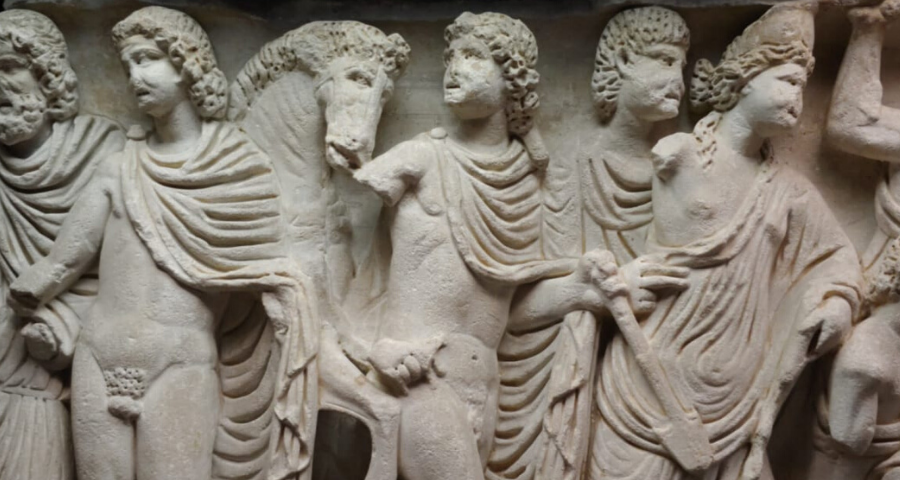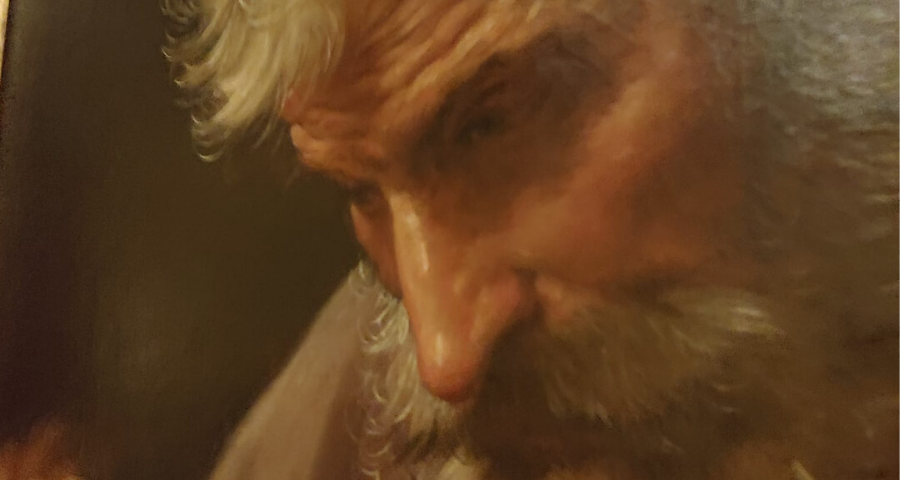Prophecy is history / 16 - A second question sometimes leads to the right and unheard response
by Luigino Bruni
Published in Avvenire 22/09/2019
«The name of Elijah as an angel is Sandalphon, one of the greatest and most terrible ones in the group, with the task of weaving crowns with prayers for the Lord, and offering sacrifices to the invisible sanctuary, seeing as the Temple only appeared to be destroyed, but actually still continues to exist.»
Louis Ginzberg, The legends of the Jews, VI
The distinction between true and false prophecy runs throughout the Bible. This story adds new elements to the understanding of the prophets and their function, in the past and today.
Although unique, biblical prophecy provides us with a paradigm for better understanding some fundamental phenomena in our society and communities. The ways, words and manner change, but there are still false prophets today, legions of them; true prophets who in good faith only say nonsense, other honest ones who often say true words but not always. Above all, there are powerful people who, while recognizing the true words of the prophets, do not listen to them. And prophets die. «For three years there was no war between Aram and Israel. But in the third year Jehoshaphat king of Judah went down to see the king of Israel. The king of Israel… asked Jehoshaphat, “Will you go with me to fight against Ramoth Gilead?” Jehoshaphat replied to the king of Israel, “I am as you are, my people as your people, my horses as your horses"» (1 Re 22,1-4). After the (wonderful) interlude of Nabot's vineyard, here we are again in the war context opened in chapter 20. Jehoshaphat, king of Judah, goes on a political visit to the North. Ahab proposes to support him in a war of re-conquest of the territories occupied by the Arameans (Ramoth Gilead). Jehoshaphat accepts but asks Ahab to consult the prophets first (1 Kings 22,5). Consulting one's God before undertaking a military enterprise was very common in the ancient world. Israel still finds itself in a border area between archaic shamanism and the more mature prophetism of the following centuries: «So the king of Israel brought together the prophets - about four hundred men - and asked them, “Shall I go to war against Ramoth Gilead, or shall I refrain?” “Go,” they answered, “for the Lord will give it into the king’s hand”» (1 Kings 22,6).
Four hundred prophets of YHWH. A remarkable number, which recalls those of Baal (450) slaughtered by Elijah on Mount Carmel. In the Bible, kings and power do not have an easy relationship with the prophets. They need it, but they are afraid of true prophets because they are free and unpredictable. The response of the prophets is entirely on the side of war: 100% in favor. Biblical humanism however is not fond of unanimity. The absence of contradiction is a bad sign. Because God speaks through diversity and in a symphony of voices. The monotony of these agreements almost always indicates some kind of foul play. This unanimity also makes Jehoshaphat, who evidently is more experienced in life and in God, suspicious and so he asks for further proof: «Jehoshaphat asked, “Is there no longer a prophet of the Lord here whom we can inquire of?"» (1 Kings 22,7). Ahab answered Jehoshaphat: «“There is still one prophet… but I hate him because he never prophesies anything good about me, but always bad. He is Micaiah son of Imlah”» (1 Kings 22,8). Ahab hates Micaiah. The kings hate the prophets of doom (of their own), even when they know that they are true and honest prophets. Here we find an echo of Jeremiah, who will find himself sharing the same fate as Micaiah. Jehoshaphat manages to get Micaiah called to court. The dialogue between the eunuch and Micaiah is interesting: «The messenger who had gone to summon Micaiah said to him, “Look, the other prophets without exception are predicting success for the king. Let your word agree with theirs, and speak favorably.” But Micaiah said, “As surely as the Lord lives, I can tell him only what the Lord tells me"» (1 Kings 22,13-14). Like many pandering collaborators, the official does not care about the truth; he just wants to indulge his boss. A very common scene, which in the story serves to clarify beyond doubt, that Micaiah is a true prophet.
Here's the first twist, however: Micaiah, whose fame as a prophet of doom is well known to us, ends up displacing us: «When he arrived, the king asked him, “Micaiah, shall we go to war against Ramoth Gilead, or not?” “Attack and be victorious,” he answered, “for the Lord will give it into the king’s hand"» (1 Kings 22,15). Micaiah gives the same answer as the four hundred prophets did, and does not break the unanimity. A second twist: instead of rejoicing in the face of what may have been perhaps the first prophecy of "good" produced by Micaiah, Ahab exclaims: «The king said to him, “How many times must I make you swear to tell me nothing but the truth in the name of the Lord?”» (1 Kings 22,16). A bizarre but important question. Ahab shows his strange kind of honesty. He senses that Micaiah’s words are not true, even if they would suit him. There are powerful people, who, although (as we shall soon see) do not listen to true prophets, know how to recognize when they are telling the truth. Many leaders have a particular flair or "charisma" of discernment, a gift that makes them fascinating and enables them to make a career. That talent of discernment of the spirits often enables them to quickly understand the people standing in front of them, to recognize even the true prophets from the false ones. The Bible tells us, however, that natural talent is not enough to put the content of those true words into practice. One of the most common "sins" of people with great gifts is not following the truth they recognize - perhaps these are precisely those mysterious "sins against the spirit" of which the Gospel speaks. At the same time, paradoxically, that natural intuition can also help the true prophet.
In fact, faced with Ahab's objection, Micaiah changes his answer and tells the truth: «Then Micaiah answered, “I saw all Israel scattered on the hills like sheep without a shepherd"» (1 Kings 22,17). It is a clear prophecy of peace, the opposite of that of the four hundred prophets. We do not know why Micaiah replied with a lie to Ahab's first question - perhaps he did not believe in listening to Ahab, ironically, out of fear, he did not trust him. Here the Bible wants to suggest something more general or universal to us, something of great importance also in the life of organizations and communities. Not only does it tell us that even a bad king can ask a good question, or that even an unfaithful king can help a prophet to be true to his truth. It tells us more. It suggests that if a manager wants to understand the right choice to make in times of crisis and difficult choices, he must be very wary of unanimous consent, and must seek out more. If everyone agrees, he should worry and look for a Micaiah in the vicinity. And then if intuitively he realizes he has a true prophet in front of him, he must not be satisfied with the first answer, especially if it resembles that given by all the others. Because this could be the case of a false answer given by a true prophet. He must learn to repeat the questions, even when he "hates" the person and the answer. In these things, remember repetita iuvant. Jesus had to repeat his question, did he loved him, three times to Peter, to get one of the most beautiful answers about friendship back. And if a bad king was once able to ask this double question, so can we.
At this point Micaiah continues his prophecy, and gives us a third twist: «I saw the Lord sitting on his throne with all the multitudes of heaven standing around him on his right and on his left. And the Lord said, ‘Who will entice Ahab into attacking Ramoth Gilead and going to his death there?’ “One suggested this, and another that. Finally, a spirit came forward, stood before the Lord and said, ‘I will entice him… I will go out and be a deceiving spirit in the mouths of all his prophets,’ he said. “You will succeed in enticing him,’ said the Lord. ‘Go and do it.’ “So now the Lord has put a deceiving spirit in the mouths of all these prophets of yours"» (1 Kings 22,19-23). Micaiah reveals something surprising to the king, which recalls the bet between God and the "satan" in the prologue of the Book of Job. Those four hundred prophets, therefore, were not false prophets: they were only deceived, and it was one of the "spirits" of God that deceived them. Wonderful! It is the first time in the Bible that we find prophets deceived by God himself. The biblical God is complicated. A spirit in his court asked him permission to deceive all the four hundred prophets. In those archaic texts YHWH was much greater than merely his good and honest spirits, evil and deceitful spirits lived within the true God as well - who fought Jacob in a night ford, who tried to kill Moses while descending from Sinai, who nailed a Son to the cross ("my God my God, why ...?"). The biblical God leads us into temptation, he does indeed. This episode continues to reveal new elements in the grammar of prophecy to us. There are not only two categories of prophets: true and false. There are false prophets who know they are false and say false things; and there are some real ones that say only true things. We already knew this. Now, however, we discover that there are also true prophets who intentionally say false things (the first being Micaiah), and other true ones who tell lies in good faith because they are even deceived by God. How difficult is it to recognize the prophets?
Ahab was able to recognize a true prophet, he talked to him, helped him to be honest, but in the end he did not listen to him: «So the king of Israel and Jehoshaphat king of Judah went up to Ramoth Gilead» (1 Kings 22,29). He knew that Micaiah 's word was true. He knew that God had established that the war would be lost. But despite this, Ahab departed. Not even the vision of the open sky converted Ahab. This disobedience of Ahab, which is terrible because it reminds us too much of our own, is rather mysterious. We know, because a real word is telling us, that the action we are about to begin is not the one we should be starting. Yet, we take the wrong path knowing that it is the wrong way. We know we should stay at home, but instead we leave. We end up staying to graze the pigs instead of getting up to go home. Ahab died in battle as well (1 Kings 22.35). But, despite his failure, the value of that double question remains - the Bible is also great because it knows how to give us words of life embedded in words of death. Before dying, Ahab wrote a line of light in his will with that tenacious question, he left us a piece of truth in a sea of lies (what if a single true line written in our lives is the thing that will ultimately save us?).
That real word cost Micaiah a slap from one of his "colleagues", Zedekiah, one of the four hundred, and then jail time (1 Kings 22,24-27). Like Jeremiah, like so many of his brothers of yesterday, today and forever. Like Elijah, still a single prophet against a multitude. Even now, though Micaiah "dies", the true word wins in the end. In fact, the Bible leaves Micaiah in this prison, it forgets him there. After this dialogue, he leaves the stage forever. But a later editor clearly wished to say goodbye to him and did so by putting the same words said centuries later by another prophet, Micah, the last of the biblical prophets, in his mouth. We would also like to greet him with those wonderful words: «Hear, you peoples, all of you!» (Micah 1,2). We are all listening Micaiah, we will not forget the many true prophets slapped and imprisoned just because they were faithful to a true and uncomfortable word.













